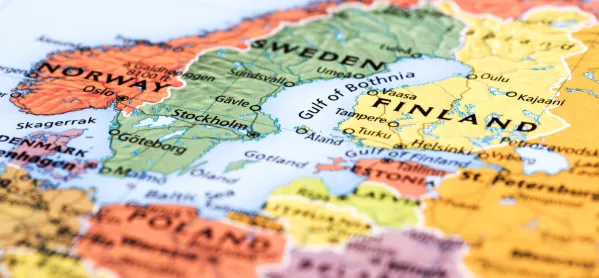5 ways we should be more like Finland during Covid-19

The periods of remote learning made necessary by the Covid-19 pandemic have caused a lot of anxiety about “missed learning”. This has led to calls to extend the school day and even for children to attend summer schools in order to “catch up”.
However, if we look to Nordic countries, particularly Finland (consistently ranked highly in global education terms, notably in Pisa - the Programme for International Student Assessment), the evidence suggests that this is not the right approach. The Finns take a holistic approach to education, where the happiness of the child is prioritised. There are many things we can learn from this small country, but here are five things to start with:
Coronavirus: What our school system can learn from Finland
1. No national testing
One of the most notable differences in Finnish education is that five-year-olds are not put through national tests (in fact, there is very little testing at all). Children do not even start formal school until age 7 and most participate in preschools with a focus on free play until that age. Preschool provision is heavily subsidised, as the right to equal access to education is enshrined in law. Forest schools are popular for preschool children in Finland. The physical and mental health benefits that come from being in nature are well documented and include improved fitness, better sleep and more confidence and independence. Which leads to the next point…
Long read: How to improve schools…from start to Finnish
Quick read: Pisa star Finland falls down rankings
A ‘climate of trust’: What can be learned from the freedom given to teachers in Finland
Finland’s ‘hobby premium’: Why we should make room for hobbies in school
Also today: ‘Pupils need individualised support - not more school’
2. More outdoor time
Finnish schoolchildren receive an outdoor 15-minute break every hour. Far from being kept indoors due to a spot of rain, the children play outdoors in all weather and are only kept inside if the weather becomes extreme (below -20C). Children in Finland learn to make their own fun, play creatively and do not suffer from the boredom that comes from overreliance on technology for entertainment. Nordic countries have a famous saying that “there is no such thing as bad weather, only bad clothing”.
3. Parity of esteem for all subjects
A further change in mindset that is worth considering is that in Finland all subjects have parity of esteem. Music is as worthwhile as maths. This allows children to develop their talents and grow as individuals. Older children are not squeezed into formal education moulds that may not suit them. Secondary-aged students can choose between general and vocational education or apprenticeships, but have flexibility and are not locked into any one path.
4. Shorter school days
Rather than putting stressed and tired children through longer school days, we should consider shortening the school day. Finnish schools typically start from 9am to 9.45am and finish from 2pm to 2.45pm. The vast majority of children attend clubs out of school. It could be argued that this is a more productive use of free time, since there is little evidence that homework raises attainment, particularly at primary school.
5. Value education and trust professionals
Education is highly valued in Finnish society and teaching is an esteemed and trusted profession. Entry into teaching is competitive and requires a master’s degree. Newly qualified teachers have already studied significant psychology and educational theory to inform their practice. Rather than subjecting young children to the tyranny of standardised tests, we should learn to accept teacher judgement of their pupils. Furthermore, rather than inspections (which like national testing, provide only a snapshot of one moment) we should trust schools’ own self-evaluations.
Finland is not perfect, but there is much we can learn from its approaches to education - particularly in the midst of this pandemic.
Gemma Clark is a primary teacher and a master’s student, based in Scotland. She tweets @Gemma_clark14
You need a Tes subscription to read this article
Subscribe now to read this article and get other subscriber-only content:
- Unlimited access to all Tes magazine content
- Exclusive subscriber-only stories
- Award-winning email newsletters
Already a subscriber? Log in
You need a subscription to read this article
Subscribe now to read this article and get other subscriber-only content, including:
- Unlimited access to all Tes magazine content
- Exclusive subscriber-only stories
- Award-winning email newsletters